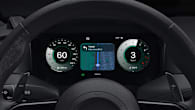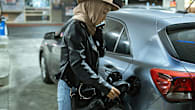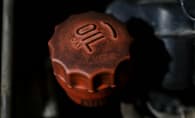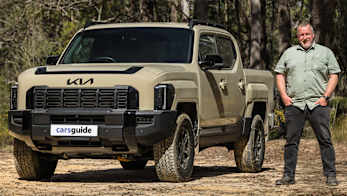Your car registration and third-party insurance cover is a major part of annual running costs.
It can range from a few hundred dollars to well over $1000, and that doesn't include the cost of making the car roadworthy or obtaining the roadworthy certificate.
But it gets complicated, and "How much does it cost to register a car" is a very involved question.
Since these services are administered on a state and territory basis, there are no Federal guidelines.
Which is why it costs more in some states and less in others.
Even then, it's not that simple, and some states include your compulsory third-party (CTP) insurance (also known as a green slip) in the overall registration fee while, in other states, deregulation of the insurance industry has meant you need to shop around and find a deal.
Here's how it pans out state by state:
Queensland
The Queensland government lumps the registration fee, CTP and a Traffic Improvement Fee into the one sum, but complicates things by levying different registration fees depending on the number of cylinders of the car in question.
Cars powered by steam or, more importantly, electric cars are charged at the same rate as a car with one, two or three cylinders.
As a guide, a four-cylinder car will cost $737.10, while a V8 jumps to $1137.15.
For more information, click here.
NSW
The premier state does it a bit differently, levying an annual registration fee of $67 and then getting specific.
Light vehicles (under 4.5-tonne) are then charged a Motor Vehicle Tax according to their mass, starting at $219 for a private vehicle up to 975kg and going all the way to more than $2000 for the heaviest light vehicles.
The information is located here
NSW has deregulated the CTP industry, so you need to buy a green slip (CTP insurance) from one of the state's approved providers.
More CTP info is available here.
ACT
Being the home of bureaucracy, you'd expect the ACT set-up to be a bit complicated.
Actually, it is more complex than most states, but the website is a dog's breakfast and utterly fails to serve up the information beyond a portal to take your money.
The fee breaks down as the CTP insurance, CTP regulator levy, a road rescue fee/care and support levy, a road-safety contribution and finally the actual registration fee.
Add it all up, the average cost for an average family car is something like $1140 a year, but you won't find that out on the website.
The website details are not worth including here.
Victoria
Victoria administers car reg through its Vicroads offices and lumps registration and CTP insurance fees together, but then makes distinctions based on where you live and the risk area associated with that region.
For normal, privately owned passenger cars, the annual fee is $834.80 in the Melbourne metro area (high risk) $779.80 in the outer metro area (medium risk) and $716 in rural areas which are deemed low risk.
South Australia
Rather than just set out its fees, the South Australian website forces you into a game of guess-which-car as you navigate the site.
In SA, you also have freedom of choice with which CTP provider you go with, although the prices seem identical (which makes sense).
So, a four-cylinder car that will be garaged in District One (the highest risk) will cost $646.06 for 12 months, while the same car garaged in District Two will cost $526.39.
The relevant webpage is here but it's convoluted. And although it includes 'Hovercraft' as a type of vehicle, you won't find 'Hatchback' listed.
Tasmania
The Apple Isle takes the same approach as Queensland, basing registration costs on the number of cylinders.
The price for a private car with three cylinders or less is $547.65 a year, and goes all the way to $691.65 for a car with 12 or more cylinders.
To those numbers you need to add the state's Motor Tax which, for those same examples, ranges from $115 to $388 respectively.
Then there's the Motor Accident Insurance Board fee (basically CTP cover) which will cost $314 for a normal car and a private owner.
The website is here, but it's not especially easy to decipher.
Western Australia
WA also relies on a vehicle's kerb mass to determine the registration (WA calls it a car license) fee.
A lightweight like a Suzuki Swift, for instance will cost $202.12, while a family car like a Holden Commodore will cost $349.16.
But that's not the end of it: WA also charges a Motor Injury Insurance charge (CTP equivalent) which is $442.24 per year for a privately owned vehicle.
On top of that, there's a recording fee of $10.30.
For more information, click here.
Northern Territory
Things are definitely different in the NT, and that starts with the way the fees are calculated.
There's a registration fee, an insurance fee and an admin fee, but we've listed the totals here.
Not only does the registration fee depend on the number of cylinders, the actual engine size also comes into the reckoning.
So, a four-cylinder car with a 900cc engine will cost $661.10 per annum, while a four-cylinder of 2600cc will rush you $762.10
However, a six-cylinder engine of the same 2600cc will cost $813.10, while a Holden Commodore V8 with 5700cc costs $1140.10
Find out more here but be careful, we found errors on the page.
It's worth remembering that the above figures are based on a private owner registering a car for the full 12 months (some states offer registration in three and six-month blocks) and not paying late or making instalment payments.
You'll usually get a discount if you're a concession card holder.
Things are different again if you're transferring your registration from another state or territory or registering a car in your name for the first time.
There are transfer fees, stamp duty on a new car (usually between two and four per cent of the purchase price and most websites include a stamp duty calculator) and even a slug for a set of number plates to be issued for the first time.
A car may also need to be inspected before it is registered if, for example, it's been repaired and returned to the road, imported from overseas or has been out of registration for too long. And yes, there'll be a fee for that, too.
And don't forget that in some states you need a fresh roadworthy certificate (also known as a pink-slip or blue slip) every 12 months just to renew registration.
Do you want personalised plates? There's another few hundred dollars in some cases.
All these add-ons can hike the cost dramatically and need to be taken into consideration when budgeting for what is an unavoidable set of costs.






.jpg)
.jpg)

.jpg)





_0.jpg)
.jpg)

.jpg)




.jpg)
.jpg)
